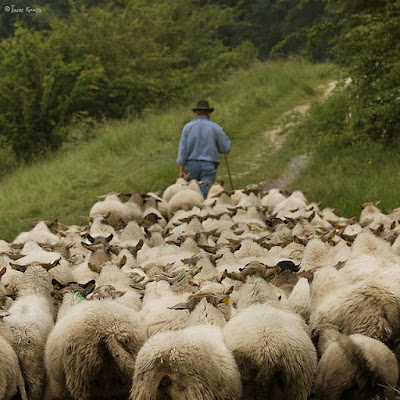THE SHEPHERD WITH THE SHEEP'S SMELL.
May 8, 2022
Fourth Sunday of Easter – C.
“My sheep hear my voice; I know them, and they follow me.”
Jn 10:27
A German proverb says: “Straying shepherd, straying sheep.”
And a Russian proverb adds, “The wolf will hire himself out very cheaply as a
shepherd.”
Genuine leadership is when shepherds smell like their sheep.
Here is one of the dearest callings of Pope Francis to Priests and Bishops. And
that could also sound like a calling to all who have positions of authority,
starting from the basic social structure, the family, to anyone in any kind of
leadership and authority. During the homily he gave on Chrism Mass on March 28,
2013, a few days after his election as Successor of Peter and Vicar of Christ,
Francis said: “This is what I am asking you, be shepherds with the smell of
sheep.” What could it mean?
The antiphon of the acclamation, the second reading, and the
Gospel give the tune of what we are celebrating today, the Good Shepherd's
Sunday. The par excellence leader, the one who gives its proper meaning to
leadership is our Lord and Savior, the Risen One. With him, leadership is
understood as service, sacrifice, and love. It is this meaning of leadership
that led him to accept the cross and to die on it for our salvation. And now
that he has Risen, the Lord leads his disciples and all believers to the
service of love and sacrifice. The Lord is our Shepherd. He is our leader.
In the Gospel, he tells us that his leadership passes
through him knowing and reckoning each one of us as his sheep. What he wants of
us, is that, like good sheep, we should follow him and listen to him. So, he
says, “My sheep hear my voice; I know them, and they follow me.”
For those who know a little about nomadic and breeder
tradition and culture, you will always see the beautiful image of sheep
following the shepherd or of shepherds walking behind their sheep. As long as
the shepherds are around and awake, no sheep go missing, nor do they lose their
way. And the most beautiful is that, even though many flocks can meet on the
way and graze together, they do not mix up or get confused. The sheep are used
to the voice of their shepherds and the shepherds know well which sheep belong
or do not belong to them. By spending so much time with the sheep, the
shepherds themselves smell like sheep, and this becomes the most normal thing.
Another great element is the sense of sacrifice of the
shepherds for their sheep is what we have in the Gospel. The Lord presents
Himself as a shepherd who cares for the life of his sheep. He says, “I give
them eternal life; they will never be lost.” The eternal life he gives them is
his own life. He sacrificed his life on the cross for us to live and not to be
lost in sin and death. That is what a good shepherd does, taking upon himself
the trials and tribulations of his sheep, taking upon his shoulder the weak,
fighting dangerous animals for them. And because he takes on himself those in
need, he is left with their smell, their wools cling to his clothes.
And lastly, a great truth of a good pastor or shepherd is
that he knows to be a steward, that the sheep belong to someone else who gave
them to him. Jesus says to have received his sheep from his Father. And because
he and the Father are one, what belongs to the Father belongs to him as well.
We, on the other hand, are just intendants of Christ. Therefore, we should care
for his flock as he does, knowing that we will be called to give an account of
our shepherdship or stewardship.
In the second reading, John, in his Apocalyptic vision tells
us that the real shepherd of the sheep is the Lamb who was slain, Christ our
Lord. He is the one who will lead the flock to a sure and save pasture and to
springs of living waters.
As Christians, we all have a mission, as we said last
Sunday. Like Paul and Barnabas, that mission is not limited but universal. It
is about bringing people to faith in Christ. And in that mission, as leaders or
shepherds, we will be confronted with hardships, rejections, and persecutions.
Just like Jesus our Good Shepherd went through tribulations and died on the
cross. We should welcome all these with positivity and move on.
Let's take the challenge to be shepherds, and not only so, but to be good shepherds. Let us be people of concern, love, and a great sense of service and sacrifice. In any form of authority and responsibility we hold, may we be ready to serve, love, and sacrifice ourselves for the people entrusted to us. May we not be like wolves in the body of a shepherd. Finally, let us pray in a very particular way today, for vocations in the Church, in religious life, in the diocesan priesthood, and the society that the good Lord may raise shepherds according to his heart.





Comments
Post a Comment